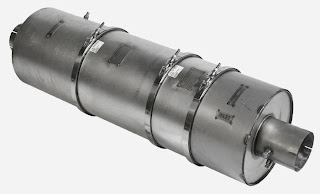If you look at this DPF diesel particulate filter you'll notice the clamps around the outside. Fortunately for all of us diesel techs this exhaust system is serviceable. The filter inside can be removed and serviced or if it's too far gone replaced. There are many shops now that have made the investment and have the equipment to clean the DPF filter properly.
The cost is about half compared to buying a pre-cleaned unit from the dealer. This is what I experience anyway... I'm not sure what the set up is at your location. The Detroit Diesel dealer has a cleaned DPF filter on the shelf for around $800.00 while the cleaning process is in two stages if it needs a 2 step melt down then the bill may run up to $500.00.
The good thing about this operation is it does not have to be done on a regular basis. Mercedes recommends every 125,000 km for a filter service. On the other hand if there is a over fueling or if the engine is using excessive amounts of oil due to a defect then the filter will plug up much faster.
The photo above shows both the MIL (malfunction indicator light) and the engine warning light illuminated. The MIL indicates there is a fault in the emissions system. This could be the DPF needs a regen or there is a lack of air flow in the intake system or numerous other problems. Most times we have found that the DPF regen is the most common service procedure.
With the laptop we do a forced regen and this cleans out the DPF filter using heat and diesel injection (Mercedes) or DEF (diesel exhaust fluid) for Cummins 2010 and newer engines. The DOC or diesel oxidation catalyst built into the DPF causes the chemical reaction to take place breaking down the soot and ash that builds up in the filter.
Cummins has taken it one step further with the SCR (selective catalytic reduction) process using DEF to reduce emissions even further. Low ash engine oil and low sulfur diesel fuel has also contributed to reducing emissions. If you have anything to add please do so below in the comments section. What do you think of the emissions in today's diesel engines?


No comments:
Post a Comment